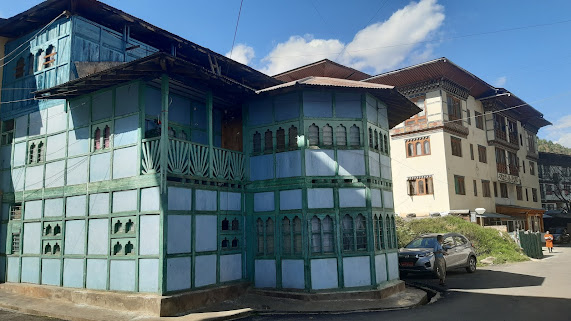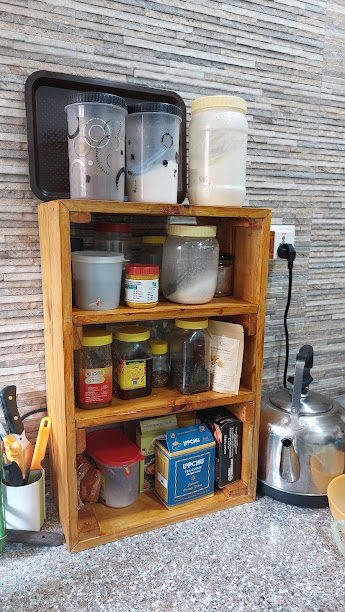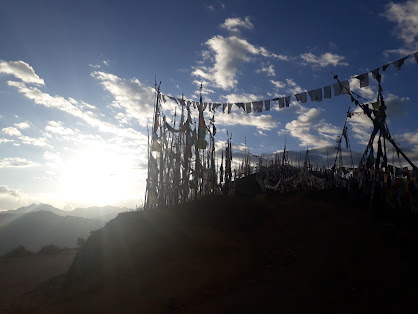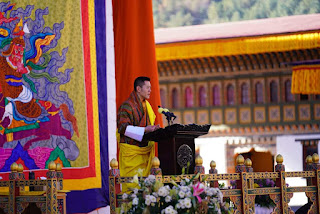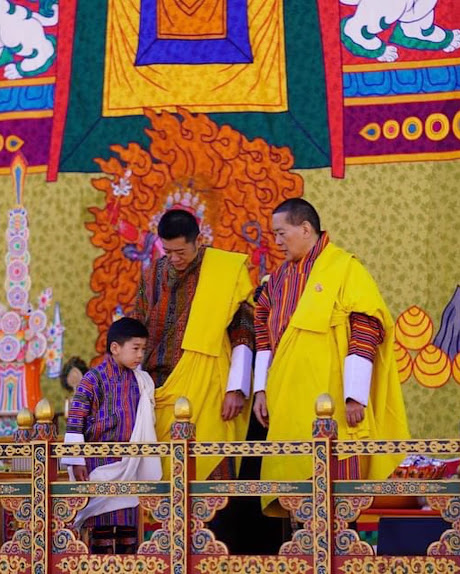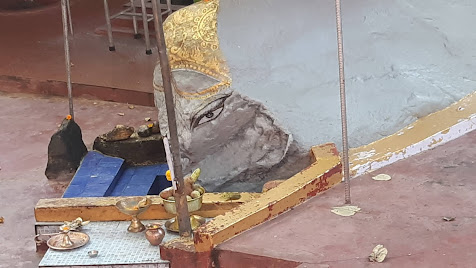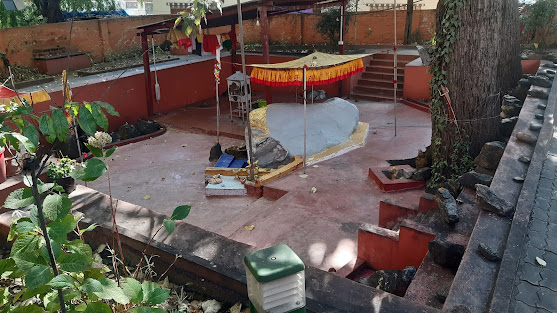17 March 2022
Four Simple #DIY Projects
28 February 2022
A Simple Tip Before Buying a Phone
It's not everyday that we buy phones. We save, we wait, we sacrifice a lot before we could have enough to buy a new phone and say goodbye to the old one that's giving us all sorts of trouble.
After all the waiting, you don't want to land up with a wrong phone or wrong price, therefore, see if this short video makes sense to you:
I am a Samsung loyal and so is my family. It's a combination of being reliable and affordable at the same time. It's a smart choice. And before I upgrade my phone I always spend a substantial amount of time studying the phone and comparing prices on TashiCell website, where they have transparently published everything including the big discounts.
By the time I go out to the outlet I know about the phone more than anyone and I don't look around at all, I just grab the phone I have chosen online.
Ani Passo - A Tribute
My ani Passo was a gentle lady who loved my father, her youngest sibling, so dearly. My late father, Phub Dorji, was as young as her children and therefore she took care of him like one of them. My father, being an uncle to her children, made sure that he lived up to the status he had in the family.
Their family was devastated when my father was killed in an accident in 1984. He was their bread earner and as much as he was a dearly loved brother and Asha. I was a baby when this happened. People looked at me and cried. Every time they saw me they felt pity on me. I didn't have a father anymore. Besides my mother, who lost her husband, it was Ani who felt the deepest pain. Seemingly, she saw her brother in me because she loved me dearly. She won't say it aloud but I knew she did.
She was a quiet lady. Her husband was a powerful Nyeep of Gangtay Palace then and she was said to have spent her younger days in the company of Royals at the Palace. But her luck soon ran out, when her husband was terminated from the palace for alleged abuse of power. He was later said to be arrested and imprisoned in Paro Dzong after the assassination of the Prime Minister, Jigme Palden Dorji in 1963.
Her husband, after his release from the prison, never came back to her. He left for Gasa and married another woman, and perhaps few more later. It was a fair deal to do so back in their times. A man could travel and father so many children in their ways, and not even be responsible for them. My Ani is said to have been so hurt that she refused to talk to him. As a child, I used to remember him visiting Haa and staying in the same house with Ani and her children. I thought he was still her husband. I never saw anything uneasy about him being in the house.
But later I understood that her reunited with his children only much later in their lives. She and her children were left to fend from themselves all their lives. Acho Dorji related to me the story of how he met his father in Thimphu when he was employed for the first time in Thimphu. He said their father left them when they were still small and only then they met him. He started reappearing in their lives from then on.
Ani was a nucleus of the family and she attracted people from near and far in her days. Her house in Yatshotenkha would be the venue of the festivities even during the lochay. Nowhere in Yangthang, I remember people having so much fun during lochay. Even though their house was in the woods, far from the village, people walked to be there. After the lochay was over, we used to have dozens of people sleeping over. Ani was such a warm person that everyone would show up. She has raised her children to be equally warm that even they were no less.
I have paid her visit at least twice a year as long as I can remember. I looked forward to meeting her as much as she did. She won't show much but I knew she loved seeing me. Later, I went to meet her with my wife, and soon I went with my daughter. She has seen me as a baby and now she was seeming my daughter. It became a full circle in her life. In her own family, her granddaughter gave her a great-granddaughter and they have a beautiful life.
But I feel, like all families, when Sonam Yangchen went for Paro to work with her husband and she Ashi Yangzo was away each day, Ani must have suffered the isolation badly. She must have felt lonely and sad but she could never articulate it because that was the life she knew. I wonder whose idea it was to build the house at Yasotenkha, away from Yangthang. It was a romantic idea in the beginning but with age that was a wrong place.
Ani started losing her sense of hearing and vision. Or maybe she was alright but she was losing her mind. When I visited her in the last few years, she has only two things to say, that she can't hear me well and that she can't see me well. I think she could see and hear. She just couldn't comprehend. It wasn't much later that one night she forgot her way home. The whole of Yangthang was alerted to look for her in the forest. It was a cold winter night and we couldn't imagine she would survive. She was found the next day from near Talung. She hadn't walked much. When she was brought home, which was filled with people from all over, she didn't even know what was going on. She didn't even know she was lost and found. She was lost.
She became a child again. She was gradually forgetting everything. She family, her speech, her ability to walk and eat and even go to the toilet. She back a baby in the diaper. She would look at you love a small baby and make sounds like a baby would do. If she was a baby we would find that cute, but when an old woman does that we found it crazy. I don't know if her children have done enough. I am just a nephew.
I felt a sense of liberation when she passed away. I couldn't imagine her being trapped in that body that won't even move. I realized why death was important. And later, I felt a little sad that such a beautiful soul who didn't even harm a fly had to die that way. But again, I thought she died that way because that's the most blessed way to die; neither she felt the pain nor us. Everyone welcomed death.
The storyteller in me was seeking a poetic justice in the fact that Ani never spoke to her ex-husband even though he appeared in their lives every year for at least 20 years. And the fact that she died without speaking to him was a satisfying yet empty feeling. Did he hurt her that deep?
Why did my ani lose her peaceful mind?
31 January 2022
Egg-nomy- The Fragile Economy of Eggs
 |
| Picture Source: Cee Dee Ventures (Facebook) |
Just another decade ago, egg was a delicacy. My mother would promise to give me an egg fry if I passed my exam. Families would save two to three pieces of eggs for special occasions. If someone broke an egg by accident, hell would break lose. I don’t think kids these days can relate to this, because now we buy eggs in trays and have it as a quick meal whenever we wish.
But seemingly we had all our eggs in one basket or to put it literally we had all our birds feed from one basket. BOOM! With a fault in one batch of feed, we lose our self-sufficiency status overnight.
With the sudden drop in the production of eggs, the supply chain was badly hit and the cruel market force driven by the greedy middlemen shot the price of egg over the roof. This is a bad market where price rises because of the misfortune of the others. I didn’t study business; in the open market, it may be considered fair enough for the price to increase with the rise in demand and drop in supply but in the business of karma it’s not going to pay.
Now, when the government is importing eggs to fill the gap, a news report says, some farmers are not happy. When the price of the eggs on my table has made me sad, I have no heart to care about the happiness of some farmers. I rather lobby for more import to control the price in the local market. We just cannot do business the conventional way, we must care, we must feel, and ripe what we saw.
29 January 2022
Where the Hills Have More Prayer Flags than Trees
- reuse old flagpoles that are lying all around uselessly. Make all the existing flagpoles public property that anyone can reuse once that prayers are faded.
- use ropes to stretch prayer flags between two poles or around one big pole. There are some fine examples. Make them popular.
- explore recycle plastic poles. I think my friend Karma Yonten can do this. He has shown the possibility with his eco-green poles.
- use steel poles. It’s far more economical because you can resell them.
- and I am wondering if it’s possible to cut out flagpoles from a big matured timber using some machine. (Business idea?)
 |
| Reusable Ru-dhar pole |
- Department of Forestry, Forest Resources Management Division must stop issuing permit for flagpoles. We must put a ban on felling young trees for flagpole or any other purpose.
- Department of Culture and Zhung Dratshang must create awareness on how the offering is about the prayer on the flag that flutter in the wind rather than the pole. Pole can be anything or nothing. Prayers matter.
27 January 2022
Is Mathang an In-law or Cousin?
I have a strange reputation among my wife’s kins for ‘shamelessly’ calling every one of her female cousins as my mathang. At first, it made them uncomfortable. But now they are beginning to accept it; either they found wisdom in my justification or they found me too crazy to argue with.
I was only stating the obvious that everyone from my wife’s side is my in-law therefore all her cousins become my mathang but by some crazy logic, they say my wife’s mathang (some of her cousins and in-laws) become my ana or ausa and that I must maintain ‘ngotsha’ with them. Wait what? Just because all my sisters become her mathang doesn’t mean all her mathang become my sisters.
What's Ngotsho?
Ngotsha perhaps has no English equivalent word because the concept doesn’t exist in the western world or maybe I am not aware of. To put it simply, I can’t tell a dirty joke in front of someone with whom I am supposed to maintain ‘ngotsha’ relation, like my mother, sister and other female relatives. But why can't I have some fun with my wife’s mathangs?
Let’s understand the meaning of Mathang and Khotkin. Mathang means sister in-law, and Khotkin means brother in-law. So far so good. It becomes little complicated when they are also used to refer to the children of your maternal uncle (ashang) and paternal aunty (ani).
Your ashang and ani’s children are your first cousins as much as the children of your paternal uncles (aku, Apchi) and maternal aunties (Azim, Amchi). But somehow this old tradition has divided the first cousins into two, making one a lesser cousin than the other. With one group, you are respectfully maintaining ngotsha, and with the other, you are quite the opposite, mischievous and flirty.
With education, cross culture marriages, and restriction from the law, it’s slowly becoming a thing of the past but not long ago, in the eastern part of the country, your mathangs and khotkins were considered the preferred candidates for marriage. Even the parents encouraged it. In fact, your real Ashang and Ani’s children are branded as Serga Mathang and Serga Khotkin, meaning golden cousins or golden opportunity, to put bluntly.
The fact that you also call your father in-law ashang, and mother in-law Ani is a not-so-subtle indication that that your maternal uncle can be your father in-law or your paternal aunty your mother in-law.
So, my argument with my mathang is, how can they call their first cousins and immediate blood relatives as mathang and khotkin while questioning my sanity over calling my marital relatives as mathang?
Isn’t it? I am, therefore, not going to maintain ngotsha with my wife's mathang. In fact, her mathang will be my double mathang.
When I heard of Dzongkha Development Commission (DDC) borrowing and approving Mathang and Khotkin as dzongkha words and adding them in dzongkha dictionary I immediately wanted to know what the words would mean in Dzongkha;
I would personally lobby for them to mean just in-laws and not cousins. Let all cousins be cousins and take away the naughty connotation it gives by calling them mathang.
Disclaimer: The culture of marrying Ashang's daughter seemed to have existed even in the western part of the country. We have a living example in my village, but we are not open or proud about it. Not anymore.
17 January 2022
Radio/Tape Recorder Licence - 1984
My brother Tenze Choda handed me an old yellowed booklet titled "Radio/Tape Recorder Licence" that he found in an old trunk at home. Knowing my interest in old stuff, he has kept it aside for me.
The booklet grabbed my attention at once. I heard about the need for a licence to own a radio and listen to it back in the days but this is the first time I am seeing one for myself. It was issued in my late father's name on 27th Feb, 1984.
It was never renewed. Eight pages kept for renewal were left blank. It's because he passed away in the same year. They said I could barely crawl when my father's body was brought to the village. He was killed in a public service truck accident near Katsho bridge. He was in his 20s.
This document is fascinating in so many way; I am looking at it and wondering how my father would have felt when we brought home a radio and the licence to listen to it. Did he place the radio on the window and let the whole village hear it? I can only imagine how much it would have meant to him and my mother.
On seeing the document, my mother remembered wrapping her radio in a piece of cloth and hiding it in a grain box when she saw a few policemen coming to our village. This seems to suggest that my parents had a radio even before they got the licence.
Almost four decades later I am holding the same document in my hand and feeling nostalgic. Just like my father who is long gone, the relevance of the document, which was once a serious matter, is gone too. It's now a piece of history almost forgotten that reflects the life in those days.
Following are some interesting clauses from the document;
1. No Radio set or a tape recorder shall be maintained and used in Bhutan except on the basis of a valid licence issued by the civil authority
2. The licence shall be valid for the calendar year of issue only and is renewable every year on the payment of the prescribed fee.
3. a) b) Radio and tape recorder for domestic use: Nu.15/-
c) For each tape recorder or radio set used in shops, restaurants and similar places of trade or business with a view to attract or entertain customers: Nu.30/-
10. The person in possession of a radio or tape recorder without a valid licence issued by the civil authority is punishable with a fine of Nu.10/-
Nu. 15 was a big amount of money back then yet people paid it to acquire the right to listen to a radio. Looking back at it now, it seems so ridiculous and oppressive. But I am sure one day we will look back and feel the same about driving license.
This small document from 1984 reminds us of how far we have come and how lucky we are now than ever before.
18 December 2021
Translation of His Majesty's Address to the Nation on the 114th National Day
On the auspicious occasion of our National Day, I offer my deep prayers to Guru Rinpoche, humble reverence to Zhabdrung Ngawang Namgyal, and profound gratitude to His Majesty the Fourth Druk Gyalpo. I extend my heartfelt Tashi Delek to the people of the 20 Dzongkhags and Bhutanese living abroad.
Despite the threats from the Covid-19 pandemic, we have continued to successfully pursue our national goals. This is due to the blessings of the Triple Gem, the good fortune of our leaders, the merit of our forefathers, and the unified efforts of our people.
The Royal Government has successfully vaccinated the vast majority of our people. This was possible through the generous assistance of many countries like India, United States of America, China, Denmark, Bulgaria, Croatia and other partners like the COVAX Initiative. The quality and efficacy of vaccines such as Pfizer, Moderna, AstraZeneca, Covishield, and Sinopharm have been impressive. The people of Bhutan deeply appreciate the assistance provided to us during these difficult times.
Today, our Nation stands secure and peaceful. Yet, the foremost question in our people’s minds is when the pandemic will end. While it is difficult to provide a definitive answer, the most important task ahead is for us to remain fully prepared and vigilant.
We need to strengthen our efforts to fight the pandemic. Led by our Prime Minister, our ministers and senior government officials have been serving to the best of their abilities. Our civil servants, members of the armed forces, De-suups and other volunteers have served with dedication. Our people have also stepped forward to serve despite their own difficulties. Members of our monastic community have performed prayers and rituals to avert the dangers posed by the pandemic. As a nation, we can be proud of the manner in which we have demonstrated exceptional resilience.
As we grapple with the challenges posed by the pandemic, we must not lose sight of the many important national tasks ahead of us. Preparing our people for the future is one such immediate task.
Our journey ahead will be fraught with challenges. Within our lifetime, the global population will increase exponentially to nine or ten billion. This will be compounded by recurring pandemics and the impact of climate change. Unequal access to knowledge and technology will create greater disparities in education, opportunities and wealth. Conflicts among powerful nations may be unavoidable.
Blockchain, Fintech, Quantum Computing, Artificial Reality, Virtual Reality, Metaverse, Robotics, Machine Learning and Web 3.0 are just some of the rapid and sweeping changes brought about by technological advancements that we are beginning to see. Breakthroughs in nanotech, biotech and genomics will transform the future. What deeply concerns me is whether our people will be in a position to take advantage of these opportunities. Or if we will be left behind due to our inability to adapt.
For example, hydropower today is an important source of our wealth. With rapid advancements in harnessing nuclear, hydrogen, fusion, solar, thermal and wind energy, hydropower may soon lose its competitive edge. We may soon become a net energy importer.
Therefore, it is imperative to seize the opportunity and enhance the capabilities of our people, and strengthen the economic and governance framework to harness the potential ushered in by these rapid and dynamic technological changes.
While the school system plays an important role in nurturing our citizens, we cannot rely on this alone. We must not lose sight of the large number of people who are not in schools and educational institutes. Many have completed high school and are still in villages and towns working on farms or in small businesses. There are also those who have jobs in the formal economy. We must realize that knowledge and skills, if not renewed, will soon become obsolete. We must inculcate in us a culture of life-long learning.
As Bhutanese, we will embark on our journey together, regardless of socio-economic status and our educational qualifications. We need to be prepared for the future so that every one of us is equipped with the skills, competencies and experience to succeed and compete in the world. We must give utmost priority to skill, up-skill, and re-skill our people to make them world-ready.
I would like to share a conversation that I had with an elderly lady in a remote village. I asked her about some of the important developmental needs of the people in the village. She said that infrastructure like roads and bridges, electricity, drinking water, irrigation, mobile connectivity, schools and hospitals, land, proximity to urban areas and access to shops remained important.
I probed further about her personal difficulties and concerns and asked her how we could alleviate them. After some hesitation, she reluctantly shared that she had come to the painful realisation that money was most important to ensure a comfortable life. She reasoned that money is important to pay for expenses associated with travel, accommodation, children’s education, essential food items, wage payment for farm help, and repayment of loans taken to renovate or build homes. Cash income has also become more important due to the decline of traditional and customary institutions and practices of self-help and community cooperation.
Her observations were very pertinent. We have all seen and experienced how difficult it has become to own decent homes, secure meaningful employment and have steady sources of income. On the other hand, expenditure keeps rising and makes our people’s livelihood difficult.
We need to resolve these issues as soon as we can, before it tears our nation apart. Providing Kidu will remain important. That said, depending solely on the government to alleviate people’s difficulties is not sustainable as the government does not have infinite resources. We will never become self-reliant, if we were to continue to depend on the government for everything.
As our youth mature and become adults, they have to shoulder greater responsibilities. They will need to take care of their parents, work, and build assets to secure their future. When they do not find opportunities at home to realize their aspirations, they will head abroad inevitably. If we are unable to create better economic opportunities for our people at home within a decade or two, there will be a scarcity of young people in Bhutan.
Creating greater economic prosperity for our people and the nation remains an important national goal. If our country prospers, the people will enjoy the benefits as they become more confident and self-reliant, and develop a greater sense of belonging to our country. Should we fail, our people will suffer.
When we talk of prosperity and wealth, it is important to distinguish between transient and enduring prosperity, so that we are clear about our national aspirations. For example, it is possible to become wealthy through gambling, rent-seeking, and other unethical means. A country can also become prosperous if it looks only at short-term gain at the expense of long-term national interest. We should never go down this path of acquiring transient wealth and prosperity.
Instead, we should focus on creating prosperity for our people and nation in a sustainable manner. A prosperity that is underpinned by good governance, smart policies and strategies, driven by innovation, creativity and enterprise, supported by a culture of hard work and determination. We can also derive enduring prosperity by better understanding and utilising our sovereign prerogatives. We can achieve generational prosperity by supporting our people as they develop their capabilities and realize their potential. We must reinvigorate the efforts made by successive governments on these fronts.
We need to strengthen our foundation by improving the educational standards, craft policies to diversify economic opportunities for our youth, and support private sector growth. The role of the civil servants is critical for this endeavour. Therefore, efforts are underway to reform the civil service.
I am grateful for the tremendous support and confidence we have got in undertaking these reforms. While working with the civil servants, I have been impressed by their qualifications, competence, and commitment to serve our people. As we work with the best of our civil servants and with foreign experts and professionals, we are learning new ideas every day and formulating fresh, clear, and bold strategies for our future.
Despite this, I have serious concerns whether we have the will to fundamentally address some of the challenges that I’ve highlighted earlier. Several efforts have been made in the past to reform and improve our governance. However, we have yet to see tangible, meaningful improvements.
Foreign experts and professionals have commented that our rules, regulations, laws and institutional procedures are among the best in the world. Yet we are not able to reap the benefits. Where have we gone wrong? Could it be due to our misplaced compassion by not holding people accountable, not removing incompetent people but instead tolerating and even rewarding underperformers?
We know our country best. We are a compassionate and close-knit society. We hesitate from giving our honest views or taking bold actions, which might risk offending or displeasing others. As a result, the strength of our national character, exemplified by courage and determination of our forefathers, has weakened; complacency has set in, discipline has waned, and corruption is on the rise. This has unfortunately given rise to a popular perception that two laws coexist in the same country. If we allow such practices to proliferate, we will become more vulnerable to even greater risks and dangers.
All of us are aware that we are a tiny, land-locked and developing country with a small population and limited resources. As the world around us changes rapidly and the future becomes more uncertain, we are becoming more vulnerable.
What we need now, more than ever, is a corresponding degree of resolve and determination for our national interest. The strength of our national character, courage, grit, and fortitude must define every aspect of our national endeavour. I have witnessed the boldness, rigour, resolve and sternness that had defined the reign of His Majesty the Fourth King. Unfortunately, these qualities have deteriorated over the last fifteen years of my reign.
From now on, all of us must boldly embrace accountability as a measure of our service, should we falter, deviate, and err in the service of our country. As King, I must first and foremost exemplify the ideal of accountability. I do not say these to trigger any alarm or anxiety. We are not too late in getting our priorities right, re-focusing our national goals, and re-aligning our national priorities and strategies. If the King, government and the people continue to work hand-in-hand with dedication, perseverance and fortitude, we still have every opportunity to further strengthen our country and achieve greater prosperity for our people.
As underpinned in our age-old saying, “the golden yoke of secular laws,” accountability must henceforth become the cornerstone of governance. We must correct those who deviate, be firm with those who do not deliver, replace those who are incompetent and terminate those who underperform and have therefore become a liability to our system and nation. We must not hesitate to expose those who engage in corrupt practices so that we send a strong signal to deter others from doing so.
There is nothing new in what I am sharing today. These are part of daily conversation among our people while expressing their concerns, hopes and aspirations. Rather than leave these concerns and sentiments within the confines of their homes, I re-articulate them today as the King’s Command on this National Day.
17 December 2021
King’s Dzongkha: the Beauty of our Language
His Majesty the King's address to the nation on the National Day is the single most important speech in the country and the most awaited moment of the year. It's the annual Royal Address to the nation that leads the nation to reflect deeply on our values and priorities as a nation and inspires the masses to take bold steps into new frontiers. It is in this moment the King talks straight to the heart of every Bhutanese across the world to remind us of who we are.
Over the years, we began to seek more in His Majesty's speech. We seek satisfaction from listening to one of the greatest orators of our time. We appreciate the art of public speaking. We marvel at the fluency and the gaps. We admire the power and clarity.
In those goosebump moments, we savour the true beauty of our Dzongkha language that we are not quite used to. The complexity associated with good Dzongkha is a myth. In the Dzongkha that the King speaks, there is hardly any bombastic word. In King's Dzongkha, we see the elegance in common words, the versatility of simple terms and undeniable dignity.
If the Dzongkha can be as elegant yet as expressive and simple as the King speaks it, then the generation of Bhutanese who are more into English may embrace Dzongkha. The People who are entrusted with promoting Dzongkha must work hard in simplifying it rather than alienating it from the ordinary people.
Over the years, I have noticed that our language is growing richer by a few words or phrases after every Royal Address. Most of the time, the words are not completely new; rather they are given a new meaning or used in a new context altogether.
10 December 2021
Why is the place called Hati-Dunga?
I thought it was just named after a random rock that looked like an elephant 🐘 but it's not. It's named after a more prominent rock and a space around it. It doesn't look so much like an elephant if not for the colour and the eyes drawn over it but it's regarded as a place of worship by the Hindus. It may be associated with Lord Ganesh.
BONUS: A Little further from the sacred rock there is a magnificent blue house that's so characteristic of Southern Bhutan. But I have never seen such a massive and elegant Lhotshampa style house across the entire southern belt, let alone Thimphu. It is a Hati among the southern Bhutanese houses and for it to be next to the Hati Dunga doesn't seem like a coincidence. How are they connected?
